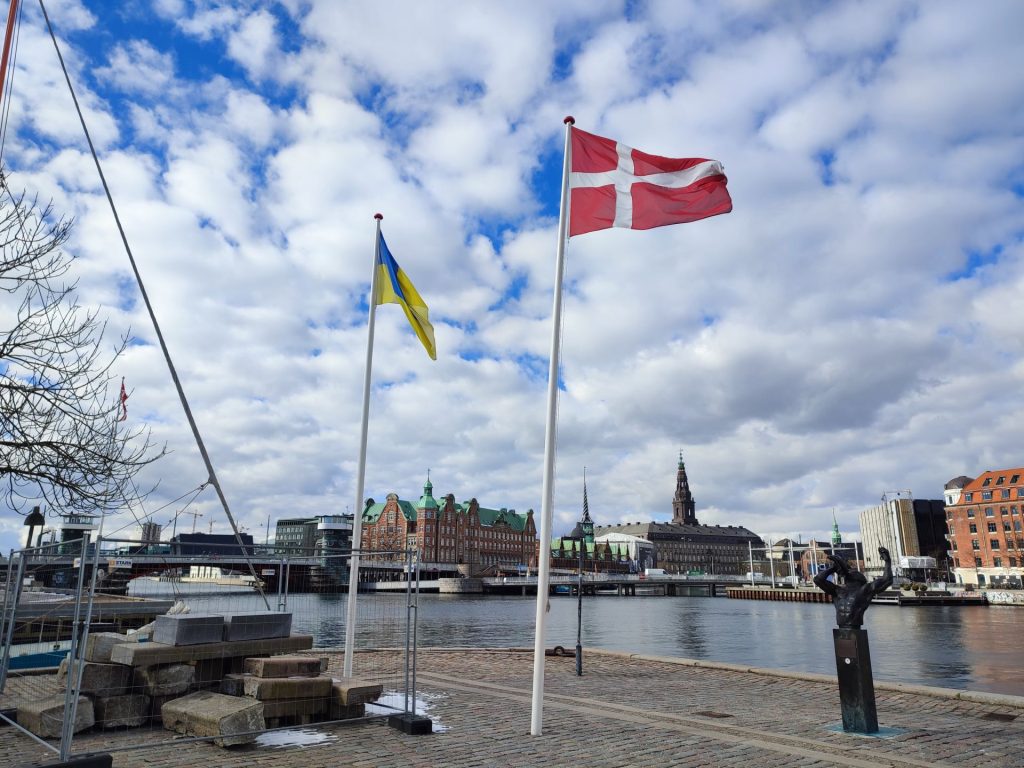Almost 852.000 million euros has been spent in support for Ukraine since 2022 according to the Danish Ministry of Foreign Affairs.

More than 40.000 Ukrainian refugees turned to Denmark since the beginning of the war in Ukraine, registered for Temporary Protection according to the United Nations High Commissioner for Refugees statistics. These numbers come in counter-expansion to the country’s previous low rates of refugees, resulting the experience of housing shortages.
But for many Ukrainians, life in Denmark was better than expected. Milena Matviichuk, a 21-year old architect from Ukraine, travelled from Lviv to Warsaw and then to Berlin to end up in Copenhagen. Now she is working as a waitress in an Italian restaurant.
“Before the start of the war, I was studying in the last year of the bachelor’s degree in architecture at the Ukrainian university KNUBA. In the summer of 2022, I completed my studies and received a bachelor’s degree remotely while staying in Copenhagen. Now I work as a waitress in Benvenuto Sinori” Milena says.

Milena Matviichuk at an Ukrainian dorm. Photo credits: Milena Matviichuk
When she first arrived, she immediately found accommodation through the Municipality of Copenhagen.
“It’s a miracle that Denmark opened its doors to Ukrainian refugees. It gave me a room in a hotel where I lived for 6 months and now I live in a dormitory for Ukrainians, but I would really like to move into a room in an apartment. They support and help.”
But bureaucracy was one of the main reasons holding her back at her attempt to find a job in the city.
“I would very much like to be able to have the documents done in a few weeks, to be able to go to work faster or receive social benefits, because everything is very expensive in Copenhagen compared to the Ukrainian currency. I waited maybe three or four months in the hotel for the documents”, says Milena.
For Daria Solovei, a 20-year old Ukrainian from Dnipro things were a little different. She came to Copenhagen with her boyfriend and the first few months they were living with a Danish family. She has graduated as a confectioner and she is currently unemployed.

During her travelling to Denmark, they come across with many people, Danes as well, who helped them with temporary accommodation and provided them with food or any essential goods.
“I met a lot of locals, they are very welcoming, they invite you to their homes all the time, but when I wrote or called people, they ignored me. It seemed to me that all this caring and welcoming was just for show, but the Danes don’t want to see anyone but Danes in their country”, Daria says.
Immigrating to another country can be difficult due to the different living conditions, the lack of money to settle and start a new life and in some cases the hosting country’s reluctance or even weakness to shelter and protect war victims. For Daria, the help she and her boyfriend received from the municipality was more than unexpected.
“I think they did everything possible to make it easier to adjust and get used to a foreign country. As for accommodation, the commune is very quick and organized in helping to find temporary accommodation and providing assistance with moving and everything you need”, she says.
Almost 1/3 of the Ukrainian refugees coming to Denmark are staying either alone or with family and friends in private properties. Those remaining are housing by the municipality’s temporary accommodation houses. Catering is provided for those who have not yet received self-sufficiency and return journey benefits. Help is provided also with applications for getting a CPR number or opening a bank account. However, the lack of immediate available housing has been a big challenge for the Municipality.
“It is true that there is generally a housing shortage in Copenhagen Municipality. As a municipality, we have been challenged to provide the necessary capacity for the temporary accommodation. This has been possible through the provision of hotels, the construction of pavilions and the use of other municipal properties”, says Thor Stefan Hiss from the Employment and Integration Administration of the Copenhagen Municipality.
“The municipality is constantly aware of the need for places in the temporary accommodation and makes sure to expand the capacity, among other things. There are pavilions under construction on Bådehavnsgade in Sydhavnen, which are expected to house more than four hundred residents”.
By Aspasia Falki & Rosa Ingemarsson
This story is for an audience in Greece and could be published on www.ekathimerini.com or www.euronews.com.